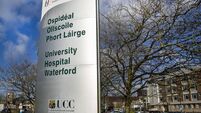Women suffer more extreme distress than men when diagnosed with cancer

Patients reported work, fatigue, and fear for the future as areas of life most extremely affected by cancer.
Women suffer with more extreme distress during cancer diagnosis and treatment than men, the first new Irish data in 10 years shows.
Up to 46% of women deal with extreme distress at diagnosis and 21% during treatment, compared to 18% of men at diagnosis and 5% during treatment while patients were likely to perceive their families as more distressed than themselves.













